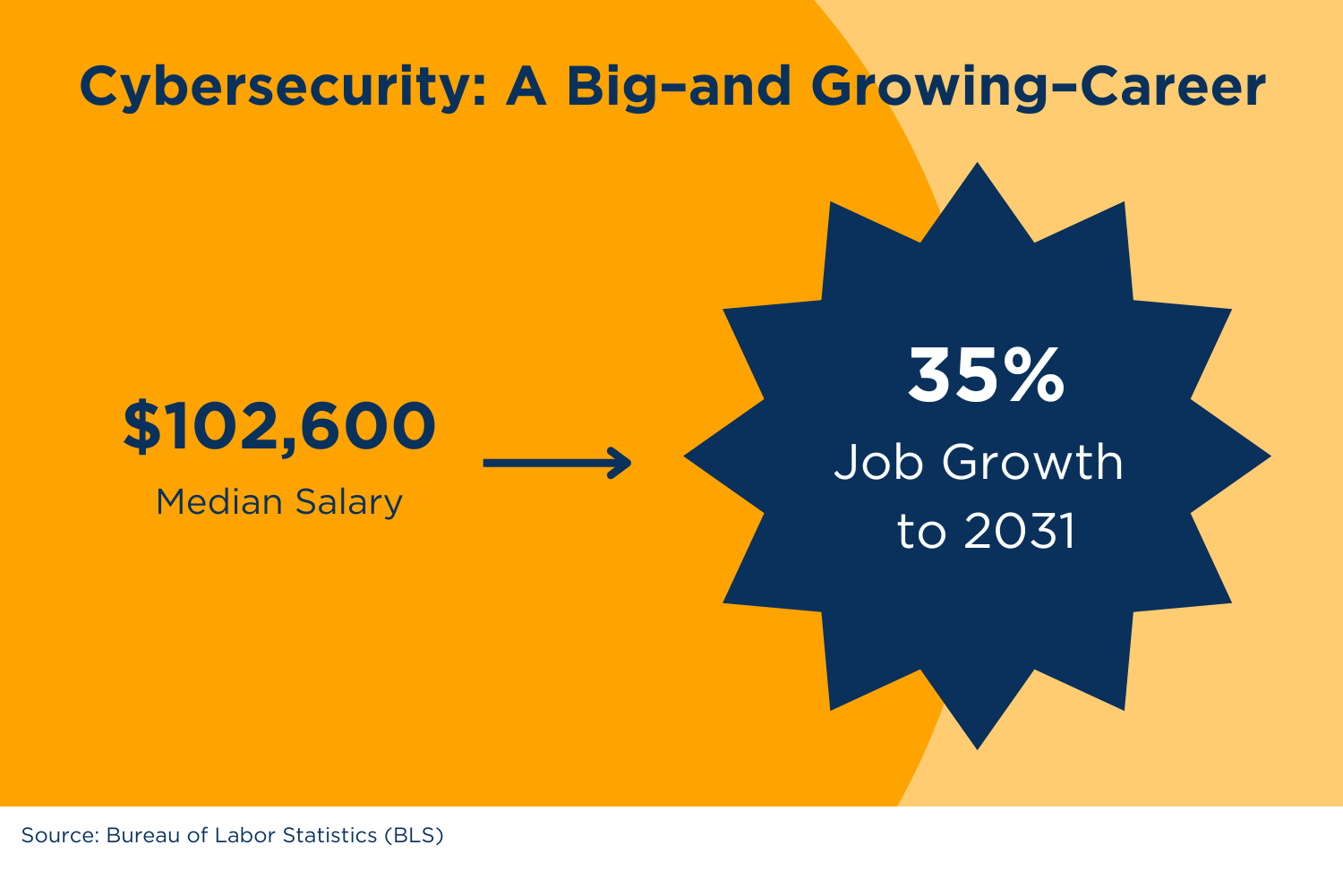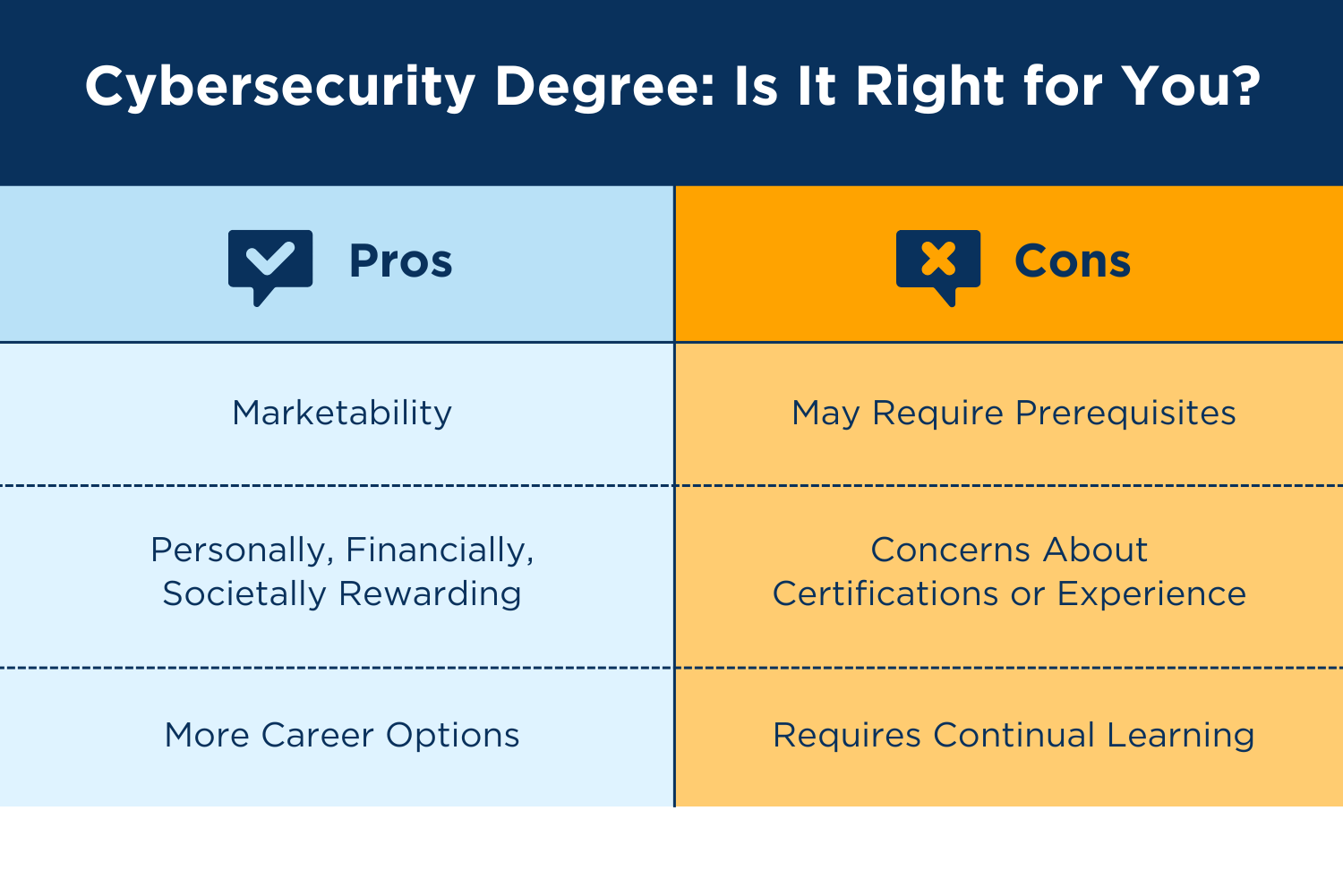Request Information
We're Sorry
There was an unexpected error with the form (your web browser was unable to retrieve some required data from our servers). This kind of error may occur if you have temporarily lost your internet connection. If you're able to verify that your internet connection is stable and the error persists, the Franklin University Help Desk is available to assist you at helpdesk@franklin.edu, 614.947.6682 (local), or 1.866.435.7006 (toll free).
Just a moment while we process your submission.

Is Cybersecurity a Good Degree for Me?
Wondering whether a cybersecurity degree is right for you? It could be–especially if a six-figure salary and double-digit job growth sounds good to you.
The good news is that cybersecurity professionals are in demand and well paid. In fact, according to the U.S. Bureau of Labor Statistics (BLS) the annual median salary for the cybersecurity job title, “information security analyst” is $102,600. Even better, the BLS expects a 35% job growth rate for the role between now and 2031, far faster than the 3% average for all occupations.

When it comes to lots of exciting job opportunities and lucrative salaries, there’s a lot to look forward to if you have a bachelor’s degree in cybersecurity. As a field, cybersecurity is big and only getting bigger. With an ever-evolving digital landscape that now includes the Metaverse and AI (artificial intelligence), cyber threats are growing and changing, too.
What Is Cybersecurity?
Cybersecurity is a specialty within information technology (IT) that involves addressing challenges and threats in light of business goals, missions and objectives. At its core, cybersecurity is the use of protective measures to prevent or mitigate unauthorized access or attack on computers and other systems in order to secure business data.
From stealing money to disrupting services to destroying records, malicious cyberattacks put people, governments and organizations at risk, making cybersecurity a mission-critical function.
All types of businesses and organizations, including the U.S. Department of Homeland Security, need qualified people with cybersecurity degrees to analyze, calculate, categorize and mitigate risks, exploits and vulnerabilities.
What Jobs Can You Get with a B.S. in Cybersecurity?
A 2023 Deloitte Center for Controllership poll revealed that almost half (48.8%) of C-suite and other executives say they expect to see an increase in the number and size of cyber events (attempts or attacks) on their accounting and other systems.
Of course, no business is immune to cyberattacks, including nonprofits, small firms and multinational companies. A jobs report from Cybersecurity Ventures predicts that there will be 3.5 million unfilled cybersecurity positions through at least 2025. Yet, despite these increases, there’s a serious gap in the availability of qualified cybersecurity professionals.
Here are just a few of the many available cybersecurity jobs, along with their average annual salaries. This information comes from a job market project from CyberSeek in partnership with labor analytics firm Lightcast, the Computing Technology Industry Association (CompTIA), and the National Institute of Standards and Technology (NIST) cybersecurity division, NICE.
- Security Architect | $151,547
- Cybersecurity Manager | $128,665
- Cybersecurity Engineer | $127,094
- Penetration and Vulnerability Tester | $120,662
- Cybersecurity Analyst | $107,517
- Cybersecurity Specialist | $106,265
- IT Security Auditor | $105,692
- Cybersecurity Consultant | $93,000
- Cybercrime Analyst | $90,000
- Incident & Intrusion Analyst | $85,000
When it comes to paying for school, grants are among your best options. But do you know how to find them? Remove the guesswork by downloading this free guide
Pros and Cons of a Cybersecurity Degree

Pros of a Cybersecurity Degree
Marketability
A bachelor’s in cybersecurity can help make you more marketable, says Denise Bergstrom, cybersecurity program chair at Franklin University.
“With a degree, you’ll have whatever foundational knowledge you had plus cybersecurity knowledge. For example, if you pursue an information technology focus for cybersecurity, you’ll be qualified for positions in both areas, not to mention have skills that are complementary. If you have a psychology background and earn a cybersecurity degree, you’d have the ability to pursue positions in human behavior and cybersecurity. Cybersecurity touches every discipline and function within an organization, which makes it flexible and offers a wide range of applications.”
Rewards
Positions in cybersecurity can be extremely rewarding, including societally, financially and personally. Working in cybersecurity lets you flex your creativity as well as your problem-solving skills. And because cyberattacks affect nearly every individual and organization all around the world, you’re literally helping protect individuals and organizations.
Options
Cybersecurity is a very broad term that includes many distinct focus areas, such as penetration testing, forensics, policy and compliance, secure development, cybersecurity project planning, and others.
“There are many options within each of these areas,” explains Bergstrom, “so if a practitioner desires a career change, they can move to another complimentary area or make a more drastic change and still benefit from their existing cybersecurity knowledge.”
Cons of a Cybersecurity Degree
May Require Prerequisites
Most cybersecurity programs are built on information technology fundamentals. If you don’t have an understanding of computers, you’ll likely need to build some basic computer skills before enrolling in a cybersecurity degree program or entering the field of cybersecurity.
Concerns About Certification or Work Experience
Though in demand, cybersecurity positions typically require certification or work experience of some kind.
“This can be a barrier to entry,” says Bergstrom. “Another potential concern is that some employers only hire from within for their cybersecurity positions because those individuals have the proverbial ‘the keys to the kingdom’.”
Requires Continual Learning
The field of cybersecurity is always expanding and ever changing. While that’s what makes the work so interesting, it’s also what makes it challenging. As such, anyone working in the field has an imperative to stay current with best practices and techniques.
What to Look for in a Cybersecurity Degree Program
Approaching cybersecurity as a profession means finding a cybersecurity degree program that helps you learn the “defense in-depth” approach to comprehensive information and electronic defense.
For example, the online cybersecurity degree program at Franklin University offers a Bachelor of Science degree with a major in cybersecurity–not just a specialization of study.
When deciding which cybersecurity degree program is right for you, be sure the program offers coursework that addresses these critical topics and issues:
- Architecture & Controls
- Business Continuity & Operations
- Disaster Recovery
- Network Security
- Risk Management
- Security Law & Compliance
- Web Application Security
Is a Cybersecurity Degree Right for Me?
Only you can decide if a cybersecurity degree is right for you. But here are a few questions that can help you make up your mind:
Are you collaborative and cooperative?
Much of information security’s success is predicated on continually sharing information about attacks and solutions with others---even those outside your organization. It’s important to check your personal ego at the door.
Are you a bad hacker or a good helper?
Ethics is a huge topic in security, so if you’re more into black hat hacking than white hat hacking or helping, then a cybersecurity degree probably is not for you. It’s of the utmost importance to learn how to use information technology security tools responsibly.
Are you logical, dependable and calm?
When it comes to information security, it’s not a matter of IF there’s going to be a breach, but WHEN–and what to do about it. This career requires people who can remain calm in the face of chaos, while thinking critically and communicating clearly.
Don’t get things wrong. Nobody’s trying to talk you into or out of a degree in cybersecurity. You just need to consider your options, examine your passions and interests and then make the best choice for you and your career.
But remember, a cybersecurity degree can prepare you to become an expert in the prevention, detection and fight against digital crime. And that can be a good thing.





